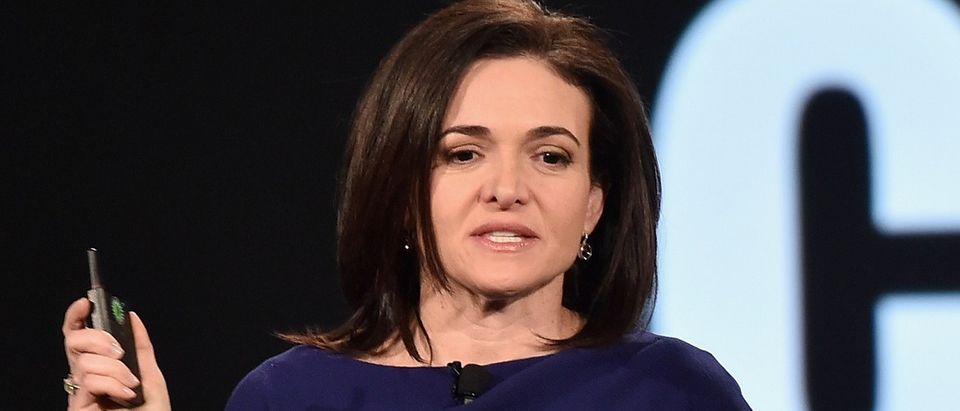Newly released emails from Defense Secretary Ash Carter’s private email account show detailed correspondence with Facebook Chief Operating Officer Sheryl Sandberg, who pressured an enthusiastic and receptive Carter to give preferential treatment to women in the military.
The Pentagon released a huge tranche of Carter’s emails Friday as a result of several Freedom Of Information requests.
As head of the non-profit organization Lean In, whose goal it is to push women into key leadership positions in different sectors of American public life, Sandberg corresponded with Carter on May 31, 2015, well in advance of his Dec. 3 decision to open all combat roles to women.
“As I mentioned in our last visit, I believe there are changes you and Secretary Carson can implement that will make a huge difference,” Sandberg wrote to Carter, referring to Brad Carson, acting under secretary of Defense for Personnel and Readiness.
” … I know Secretary Carson has reviewed our recommendations on policies and actions to build a more diverse military,” she added.
For Sandberg, not enough women are represented in the military and that problem only compounds when examining high-level positions across the services.
For instance, Lean In’s policy document, which Sandberg sent to Carter, states that women are “only 14.5% of those enlisted across all branches.”
Sandberg wanted to make sure first that the all roles were actually opened, but also that women received preferential treatment in the military at large.
The first proposal Lean In recommended was to restructure and reform promotions in the military to “counter biases that are preventing women from reaching their full potential.”
This proposal includes carefully examining promotion criteria to see if they “filter out a disproportionate amount of women and/or minorities.” The implication seems to be that if too many women are filtered out, then the standards practically by definition cannot be gender neutral, and so should be scrutinized and potentially reworked.
Promotion boards, too, should be assessed to make sure they represent a “diverse military.” These decision-makers also need to receive training to make sure they don’t have any biases.
Additionally, women in the military often take leaves of absence, due to issues like pregnancy, which naturally hurts their chances at promotion. For Lean In, the discrepancy seems unacceptable. Instead, the career track should allow far more flexibility to make sure that in spite of pregnancy, women still comprise a much larger portion of military leadership.
The military’s obligations, according to Lean In, are not concluded after a female servicemember gives birth. Rather, the military should shift the hours of child care development centers to open 15 minutes before duty reporting.
There should also be lactation rooms on all bases.
“Pregnancy is a top driver of female attrition across all branches,” the report notes. “We suggest that the DOD find ways to offer female service members who are (or who are thinking about becoming) pregnant assistance with planning their next career moves.”
Increasing maternity leave and helping women every step of the way during pregnancy is necessary to lower female attrition rates in the military and make sure they get into leadership positions in the military.
To support these efforts, Lean In recommends messaging from the highest levels of the Pentagon that a diverse military is “mission critical.”
“Messaging on women and minorities needs to be positioned as mission-critical to creating a stronger and more effective military.”
The Department of Defense should also appoint a leader to head Lean In Circles through each and every service.
“Having a safe space to talk about gender in the military is an important step, yet women avoid talking about gender in an effort to ‘fit in’ with the men,” the policy document states.
“I’ve spoken with my team and can do something privately or publicly to support any policy announcements you’re ready to make that are in support of women’s leadership across the military,” Sandberg concluded in her email. “I am here to help you lead on this.”
Carter responded enthusiastically and signed off, “Your friend” just a day after Sandberg sent her correspondence.
Sandberg sent another email September 21, 2015, applauding Carter and saying, “Your commitment to creating a force as diverse as the nation it serves is something that will change our military—and our culture overall.”
“I truly believe that together, we are making the world a bit more equal,” she said.
Carter was ecstatic at the praise.
“I thank YOU Sheryl for your inspiration,” Carter said. “It is easy to fall in behind the strong and persuasive way you help me make the case. I learned a lot…I am so pleased that this gives you some happiness. I wish you strength every day. Please call me Ash.”
On December 3, 2015, Carter announced that all combat roles would open up to women and denied the Marine Corps’ exemption request to keep infantry and special operations roles male-only, saying he wanted to keep standards consistent across all services.
Follow Jonah Bennett on Twitter
Send tips to jonah@dailycallernewsfoundation.org.
All content created by the Daily Caller News Foundation, an independent and nonpartisan newswire service, is available without charge to any legitimate news publisher that can provide a large audience. All republished articles must include our logo, our reporter’s byline and their DCNF affiliation. For any questions about our guidelines or partnering with us, please contact licensing@dailycallernewsfoundation.org.


